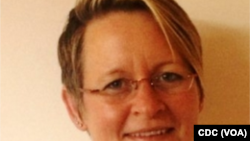That Zimbabwe has made progress in reducing HIV-infection in the country is a feat, many applaud. But some health experts warn if unchecked, stigma, discrimination and complacency could reverse the gains.
Dr. Beth Barr, the new country director at the U.S. Centers for Disease Control and Prevention, said ironically, the strides made in fighting the disease is partly feeding complacency.
“It’s partly because of the remarkable progress that has been made, that sometimes there's a perception both locally and internationally that the challenge of HIV has been solved,” she said.
However, Dr. Barr cautioned against complacency and the façade that the battle against HIV and AIDS has been won, especially in light of people living longer and enjoying a better quality of life and even looking healthy, due to increased access to treatment.
She said the fight is far from over. “There is absolutely no room for complacency when HIV still causes over 100-deaths a day, just in Zimbabwe.”
To put it in context, she referenced death from the Ebola virus that ravaged mostly Sierra Leone, Liberia and Guinea last year, killing more than 10,000 people.
“You can contrast that to any daily number of deaths in the recent West Africa Ebola epidemic and it makes it very real.”
OVERCOMING COMPLACENCY
To overcome complacency, Dr. Barr said it’s important for everyone to take responsibility, including avoiding risky behavior that could expose one to the virus such as using condoms, following prescribed treatment course if already diagnosed with HIV, and continued testing and awareness raising by the responsible authorities.
“The people who are on ARTs [Anti-Retroviral Therapy] are responsible for taking their medicines every day to prevent resistance and a viral rebound. The health workers are responsible for ensuring that testing and treatment are consistently available, you know government and intimating partners are responsible for ensuring that health workers can and do implement their national guidelines that are high standard of quality,” she said.
The group that is shown most vulnerability in exposure to HIV, as a result of complacency and other factors are the youth. Many are reportedly engaging in risky behavior such as having unprotected sex at vuzums or parties where group sex is involved.
The action by the youth is reportedly driven by the false belief that they are invisible and unaffected. Though Dr. Barr could not speak directly to this practice, he said youth worldwide tend not be always aware of the harmful consequences of such behavior. She said studies currently underway will determine the extent of such a practice.
“We have trained the data collectors to be very sensitive how they work with people to gain information, so I think first of all, that will provide more details as to the scope of such a problem if it exists,” said Dr. Barr, referring to the sex parties.
She added, however, “unfortunately it’s a challenge for us anywhere in the world for young people to fully understand the consequences of their behavior.”
STIGMA REDUCTION
When it comes to stigma, Dr. Barr said she hoped increase access to treatment will reduce stigma which often results in discrimination and isolation. She said treatment now allows people to look healthy, as opposed to before treatment, when many experience extreme weight loss and other visible symptoms.
“When you make treatment widely accessible, you minimize the more obvious signs of HIV that people are familiar with like in the 80’s and 90’s,” Dr. Barr said. “We’ve seen across the region that as ART access is decentralized, and PMTC [Prevention of Mother to Child Transmission] options scaled up, we’ve seen that more and more.”
Dr. Barr also stressed the importance of a strong and supportive family environment to fight stigma, saying in the absence of this, those who suspect they have HIV won’t seek treatment, while those living with it, tend to hide their status and avoid taking their medication, for fear of being caught.
“I think that within families, stigma is the biggest single threat to both starting and keeping people on ARVs. If they (people living with HIV) can’t trust their family members with their HIV status, they’ll be scared to keep their pill bottles and health cards at home, with fear that someone might find them,” she said.
Achieving 90-90-90 Target
Dr. Barr said for the 90-90-90 strategy to work – the ambitious UNAIDS target to have 90% of people living with HIV knowing their status, have 90% of people with HIV on ART, and enable those 90% on treatment to have a reduced viral load by the year 2020 - stigma of all kinds should be addressed and eliminated.
“To reach the 90-90-90 target, I think it’s important that stigma continue to be addressed, and to continue the emphasis that we must be open and accepting of all people with HIV, so that they feel safe to learn their status, go for testing, to seek care and treatment and remain consistent in their use of ARV,” urged Dr. Barr.
Dr. Barr said also key to ending stigma and the discrimination that comes with it, worldwide, is for people to be encouraged to speak more openly about their HIV-positive status, the same way people speak openly about suffering from non-communicable diseases such as diabetes, high blood pressure or cancer.
“When you see normal, very healthy looking people acknowledging their HIV status and living with a very positive mindset, it does reduce that fear of HIV quite a bit,” Dr. Barr said.
PEPFAR IMPACT
Dr. Barr has been involved in fighting HIV for more than 15 years, working in several African countries, including Botswana, Malawi and Tanzania. She said her goal is to ensure that funding to fight HIV in places like Zimbabwe continues, by noting the impact of programs such as PEPFAR, the U.S. President’s Emergency Plan for AIDS Relief.
“By demonstrating that PEPFAR effort and funding are both cost effective and high impact, we then help make it clear that investment in HIV-services and health systems in Zimbabwe is a very powerful way to address the global HIV epidemic, said Dr. Barr.
Health experts continue to push for an end to stigma, discrimination and complacency by urging everyone to find out their HIV-status, by visiting the various treatment and counseling centers around the country. They say this will help also curb the spread of HIV as those who find out they are negative, will practice safe-sex, while those who are positive, will seek treatment to live a long and healthy life.






